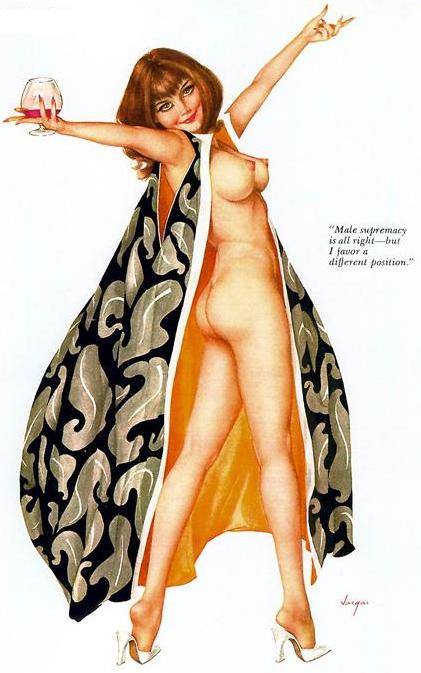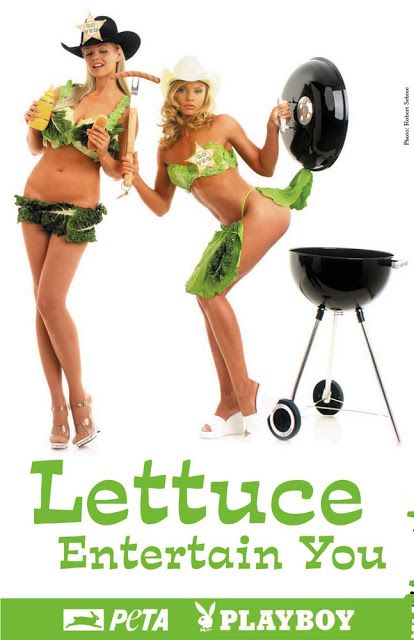Sexist advocacy is normalized within the Nonhuman Animal rights movement. Most readers are likely aware of the infamous PETA campaigns that use the naked bodies of women to grab attention, but sexually objectifying vegan women “for the animals” might now be the status quo. Case in point: the Cabbage Chicks.
In 2013, a grassroots group based out of Milwaukee tabled the city’s PrideFest featuring two young white women, topless save for a pair of cabbage leaves glued to their breasts. Their nudity was exploited as a teaser to attract visitors, and they awarded stickers to those who took the bait and donated. The stickers read: “I SPONSORED A PUSSY.”
When criticized, the organization insisted that it was unaffiliated with the campaign. Apparently, these women came up with this idea on their own to “help draw attention” to the tent, and “they had fun doing it.” The organization’s president assured that dressing up in vegetable costumes was “empowering.” PETA takes a similar position in response to feminist critique.
Cheers to them, of course, if they indeed had fun and felt empowered, but this is far from an individual act. Naked protesters frequently represent an organization, and organizations clearly condone these stunts by promoting the women’s semi-nude images on social media accounts. Individualizing women’s protest, however, removes culpability and risk. When campaigns succeed, the organization can reap the benefits. When they falter, the individual volunteers can be blamed.
Defending the Campaign
What if men get naked sometimes, too? One organizational representative noted that one man also took his shirt off and helped out: “There was a male dressed up as well, not sexist.” Yet, in our deeply sexist society, the bodies of men and women are not interchangeable. Men’s bodies are interpreted differently, generally in ways that empowers them and reasserts their dominance. Women’s naked bodies have yet to be divorced from the larger structure of degradation and sexual objectification. Again, PETA also deflects with this false equivalent when pressed by feminist critique.
The organization’s president also stated: “I’m not completely making the connection on how this is any different than wearing a swimsuit at a public beach.” Of course, beaches can be sites of oppression for women as well, but for the most part, wearing bathing suits on the beach is not going to draw attention to women in the same way wearing cabbage leaves in an information booth would. While PrideFest is arguably much more nudity-normative, it should be considered that women dressed as food reinforces the notion that women are consumable commodities (isn’t treating vulnerable persons like edible things exactly what activists are hoping nonvegans to get move away from?). The double entendre of the “I SPONSORED A PUSSY” sticker only reinforces the misogynist message.
Contextualizing the Campaign
This stunt is only one of several other problematic campaigns. In another, they had a young woman stand by the side of the road with meat cuts drawn on her naked body. The organization suggested that it was less problematic because it’s “not really sexy,” but using a naked woman’s body to emulate violence against animals is arguably worse.
In another campaign (not staffed by the organization itself, but promoted on its Facebook page), two bloodied women lay prostrate on the ground with a metal pipe by their bodies. A man in black (drawing on the imagery of the stereotypical rapist or murderer) stood over top their “corpses” brandishing a woman’s animal hair coat. This campaign targets female consumers (the primary wearers of “fur”) by drawing on imagery of violence against women. The organization’s response? “AWESOME! Thanks for all that you do for the animals! <3”
The PETA Effect
I share this incident to demonstrate that something systemic is at work here. The use of naked or nearly naked young women (usually white and always thin) and the use of women’s bodies as stand-ins for dead Nonhuman Animals are both increasingly popular tactics resulting from the hegemonic presence of PETA. As the largest Nonhuman Animal rights organization, PETA has the cultural power to define what types of advocacy are popular, expected, and legitimate. Ultimately, PETA is reflecting popular advertising techniques from the business world, those that are developed by men for patriarchal purposes (i.e. “sex sells”). In other words, it is not simply about women’s personal “choice.” Instead, there is a more powerful movement structure working to narrowly define what choices are available to female activists.
Regardless of individual women’s choices, activists should be concerned about the larger implications for women as a demographic. Western society trivializes and even condones rape, and according to RAINN, an American is sexually assaulted every 2 seconds (most of these are victims are women). Psychological and sociological research has shown that sexual objectification of women and trivialization of violence against women is correlated with the devaluation of women and increased violence against women. It even leads women to self-objectify and achieve much lower levels of self-efficacy. Self-efficacy is important, not only in fighting against one’s own oppression, but in feeling worthy enough to participate in social movements . . . including Nonhuman Animal liberation.
What is more, this kind of advocacy does not solicit the desired effects. The tools of misogyny only build more misogyny.
Criticizing these tactics isn’t about policing women’s behavior. Vegan feminism is instead responding to the rape culture that Nonhuman Animal rights organizations perpetuate to the detriment of women. Organizations must accept responsibility for the wider implications of this type of advocacy. Nude campaigns are mostly legal, just like rape jokes are legal, but that does not exempt them from criticism. Shutting down well-meant discussion about the hurt that sexist advocacy causes women is problematic. It is also indicative of how toxic the Nonhuman Animal rights movement has become for women and other vulnerable groups. The bottom line is that activists cannot articulate a clear message of anti-oppression for other animals so long as the movement uncritically exploits and aggravates the oppression of other vulnerable groups.
Here’s a radical notion…what if women didn’t have to be sexy cabbages to advocate for the end of violence against animals? What if women got to be persons? I think a person makes for a better activist than a cabbage any day.
 Dr. Wrenn is the founder of Vegan Feminist Network. She is a Lecturer of Sociology and Director of Gender Studies with Monmouth University, council member with the Animals & Society Section of the American Sociological Association, and an advisory board member with the International Network for Social Studies on Vegetarianism and Veganism with the University of Vienna. She was awarded Exemplary Diversity Scholar 2016 by the University of Michigan’s National Center for Institutional Diversity. She is the author of A Rational Approach to Animal Rights: Extensions in Abolitionist Theory.
Dr. Wrenn is the founder of Vegan Feminist Network. She is a Lecturer of Sociology and Director of Gender Studies with Monmouth University, council member with the Animals & Society Section of the American Sociological Association, and an advisory board member with the International Network for Social Studies on Vegetarianism and Veganism with the University of Vienna. She was awarded Exemplary Diversity Scholar 2016 by the University of Michigan’s National Center for Institutional Diversity. She is the author of A Rational Approach to Animal Rights: Extensions in Abolitionist Theory.




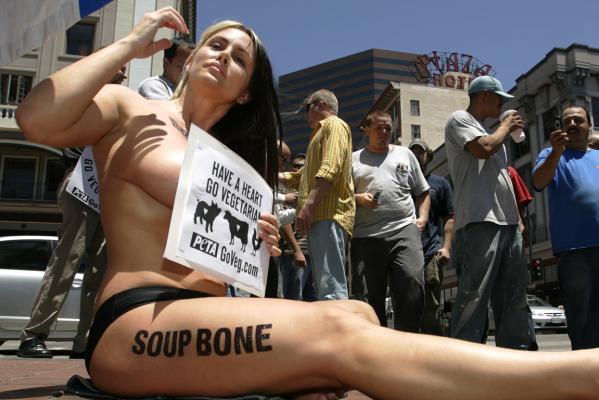

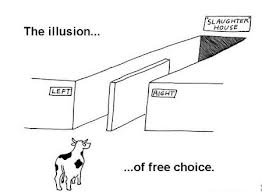
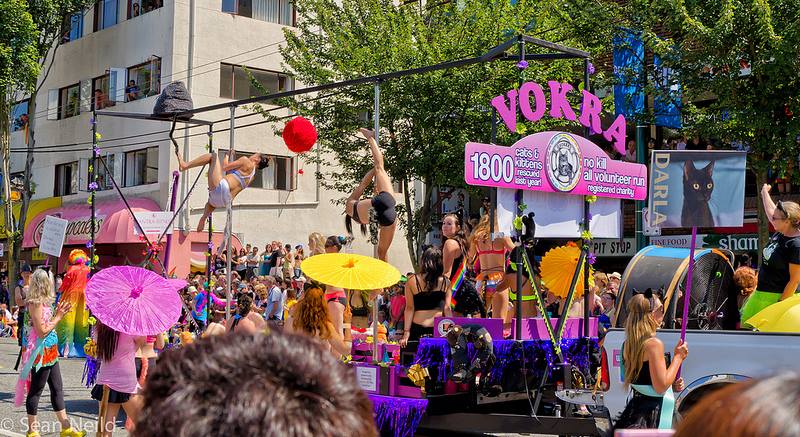 Relatedly, the sexual objectification of women and the consumption of pornography is linked to increased violence and rape against women. Take a guess which women experience the highest rates of violence and rape? The privileged able-bodied white cis women who dominate naked protest? Nope, guess again. It is actually women of color, poor women, lesbian women, trans women, disabled women, and other vulnerable women pay the price of white women’s “empowerment.” Privileged young white women can enter public spaces, flaunt their sexuality, and find it “liberating,” but it’s the masses of poor and disadvantaged women who are not allowed to participate who also bear the brunt of that “liberation” through rape, sexual harassment, and beatings.
Relatedly, the sexual objectification of women and the consumption of pornography is linked to increased violence and rape against women. Take a guess which women experience the highest rates of violence and rape? The privileged able-bodied white cis women who dominate naked protest? Nope, guess again. It is actually women of color, poor women, lesbian women, trans women, disabled women, and other vulnerable women pay the price of white women’s “empowerment.” Privileged young white women can enter public spaces, flaunt their sexuality, and find it “liberating,” but it’s the masses of poor and disadvantaged women who are not allowed to participate who also bear the brunt of that “liberation” through rape, sexual harassment, and beatings.